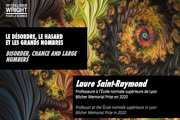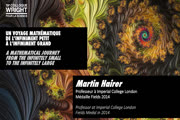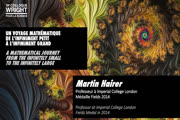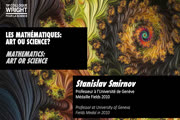 02/11/2020Le chaos: imprévisible mais compréhensible [1:38:52]1826
02/11/2020Le chaos: imprévisible mais compréhensible [1:38:52]1826 VN4-1b64-2020-2021-11-03Il est inhabituel qu’une idée mathématique se diffuse dans la société. C’est pourtant le cas avec la théorie du chaos, popularisée grâce à l’effet papillon, imaginé par le météorologue américain Edward Lorenz qui, en 1972, a posé la fameuse question: «Le battement des ailes d’un papillon au Brésil déclenche-t-il une tornade au Texas?». L’idée dans cette image est qu’une cause minime peut avoir de grandes conséquences. Mais peut-on résumer la théorie du chaos d’une manière aussi simpliste? Une théorie scientifique peut-elle se contenter d’énoncés négatifs? Les mathématiciennes et les mathématiciens sont-ils responsables de la transmission inadéquate de cette théorie? Cette conférence s’appliquera à traiter de ces questions et, en particulier, à décrire le côté positif de la théorie. Car il y en a. En effet, il arrive que le chaos engendre une espèce d’ordre. Les systèmes chaotiques sont peut-être imprévisibles mais ils sont loin d’être incompréhensibles.
VN4-1b64-2020-2021-11-03Il est inhabituel qu’une idée mathématique se diffuse dans la société. C’est pourtant le cas avec la théorie du chaos, popularisée grâce à l’effet papillon, imaginé par le météorologue américain Edward Lorenz qui, en 1972, a posé la fameuse question: «Le battement des ailes d’un papillon au Brésil déclenche-t-il une tornade au Texas?». L’idée dans cette image est qu’une cause minime peut avoir de grandes conséquences. Mais peut-on résumer la théorie du chaos d’une manière aussi simpliste? Une théorie scientifique peut-elle se contenter d’énoncés négatifs? Les mathématiciennes et les mathématiciens sont-ils responsables de la transmission inadéquate de cette théorie? Cette conférence s’appliquera à traiter de ces questions et, en particulier, à décrire le côté positif de la théorie. Car il y en a. En effet, il arrive que le chaos engendre une espèce d’ordre. Les systèmes chaotiques sont peut-être imprévisibles mais ils sont loin d’être incompréhensibles. 02/11/2020Chaos: unpredictable but understandable [1:39:04]440
02/11/2020Chaos: unpredictable but understandable [1:39:04]440 VN4-1b64-2020-2021-11-04It is unusual for a mathematical idea to spread through society. But this is the case with chaos theory, popularized by the butterfly effect, imagined by the American meteorologist Edward Lorenz, who in 1972 asked the famous question: “Does the flapping of a butterfly’s wings in Brazil trigger a tornado in Texas?” The idea in this picture is that a small cause can have big consequences. But can chaos theory be summed up in such a simplistic way? Can a scientific theory be satisfied with negative statements? Are mathematicians responsible for the inadequate transmission of this theory? This lecture will attempt to address these questions and, in particular, to describe the positive side of the theory. Because there is a positive side. Chaos sometimes creates a kind of order. Chaotic systems may be unpredictable, but they are far from incomprehensible.
VN4-1b64-2020-2021-11-04It is unusual for a mathematical idea to spread through society. But this is the case with chaos theory, popularized by the butterfly effect, imagined by the American meteorologist Edward Lorenz, who in 1972 asked the famous question: “Does the flapping of a butterfly’s wings in Brazil trigger a tornado in Texas?” The idea in this picture is that a small cause can have big consequences. But can chaos theory be summed up in such a simplistic way? Can a scientific theory be satisfied with negative statements? Are mathematicians responsible for the inadequate transmission of this theory? This lecture will attempt to address these questions and, in particular, to describe the positive side of the theory. Because there is a positive side. Chaos sometimes creates a kind of order. Chaotic systems may be unpredictable, but they are far from incomprehensible. 03/11/2020Le désordre, le hasard et les grands nombres [1:35:43]356
03/11/2020Le désordre, le hasard et les grands nombres [1:35:43]356 VN4-1b64-2020-2021-11-12Le désordre augmente de manière irréversible. Cette affirmation ne concerne pas forcément la chambre d’un enfant ni la marche du monde. Elle est l’énoncé du second principe de la thermodynamique, exprimé par le physicien Sadi Carnot en 1824. C’est un principe que l’on peut expérimenter tous les jours. Lorsqu’on verse du lait dans de l’eau, par exemple, les deux liquides se mélangent et ne restent pas séparés l’un de l’autre. Les billes à jouer contenues dans un sac ne vont pas s’aligner spontanément selon leur couleur mais se mêler de manière aléatoire. S’il est facile de mélanger deux gaz, il est quasi impossible de les séparer une fois réunis. Cet exposé propose d’étudier un modèle mathématique simple qui explique pourquoi nous pouvons observer un mélange spontané mais pas le phénomène inverse. Spoiler alert: la clé pour comprendre cette irréversibilité temporelle se trouve dans la théorie des probabilités et plus précisément dans la loi des grands nombre.
VN4-1b64-2020-2021-11-12Le désordre augmente de manière irréversible. Cette affirmation ne concerne pas forcément la chambre d’un enfant ni la marche du monde. Elle est l’énoncé du second principe de la thermodynamique, exprimé par le physicien Sadi Carnot en 1824. C’est un principe que l’on peut expérimenter tous les jours. Lorsqu’on verse du lait dans de l’eau, par exemple, les deux liquides se mélangent et ne restent pas séparés l’un de l’autre. Les billes à jouer contenues dans un sac ne vont pas s’aligner spontanément selon leur couleur mais se mêler de manière aléatoire. S’il est facile de mélanger deux gaz, il est quasi impossible de les séparer une fois réunis. Cet exposé propose d’étudier un modèle mathématique simple qui explique pourquoi nous pouvons observer un mélange spontané mais pas le phénomène inverse. Spoiler alert: la clé pour comprendre cette irréversibilité temporelle se trouve dans la théorie des probabilités et plus précisément dans la loi des grands nombre. 03/11/2020Disorder, chance and large numbers [1:35:43]330
03/11/2020Disorder, chance and large numbers [1:35:43]330 VN4-1b64-2020-2021-11-12-ADisorder increases irreversibly. This statement does not necessarily apply at any given time to a child’s bedroom or to the way the world works. Rather, it is the statement of the second principle of thermodynamics, expressed by the physicist Sadi Carnot in 1824. It is a principle that can be experienced every day. When milk is poured into water, for example, the two liquids mix and do not remain separated from each other. Playing balls in a bag will not spontaneously line up according to their colour but will mix randomly. While it is easy to mix two gases together, it is almost impossible to separate them once they have been brought together. This talk takes a look at a simple mathematical model that explains why we can observe spontaneous mixing but not the opposite phenomenon. Spoiler alert: the key to understanding this temporal irreversibility lies in probability theory and more precisely in the law of large numbers.
VN4-1b64-2020-2021-11-12-ADisorder increases irreversibly. This statement does not necessarily apply at any given time to a child’s bedroom or to the way the world works. Rather, it is the statement of the second principle of thermodynamics, expressed by the physicist Sadi Carnot in 1824. It is a principle that can be experienced every day. When milk is poured into water, for example, the two liquids mix and do not remain separated from each other. Playing balls in a bag will not spontaneously line up according to their colour but will mix randomly. While it is easy to mix two gases together, it is almost impossible to separate them once they have been brought together. This talk takes a look at a simple mathematical model that explains why we can observe spontaneous mixing but not the opposite phenomenon. Spoiler alert: the key to understanding this temporal irreversibility lies in probability theory and more precisely in the law of large numbers. 04/11/2020Un voyage mathématique De l’infiniment petit à l’infiniment grand [1:38:11]781
04/11/2020Un voyage mathématique De l’infiniment petit à l’infiniment grand [1:38:11]781 VN4-1b64-2020-2021-11-10Le monde minuscule des particules et des atomes et celui gigantesque de l’univers tout entier sont séparés par environ une quarantaine d’échelles de grandeur différentes. En passant de l’une à l’autre, les lois de la nature peuvent parfois se comporter de manière drastiquement différente, obéissant tantôt à la physique quantique, à la relativité générale, ou encore à la mécanique classique de Newton, sans parler des autres théories intermédiaires. Comprendre les transformations qui s’opèrent d’une échelle à l’autre est une des grandes questions classiques en mathématiques et en physique théorique. Cet exposé a pour objectif d’explorer comment ces questions informent et motivent encore des problèmes intéressants en théorie des probabilités et pourquoi des «toy models», malgré leur caractère superficiellement ludique, peuvent parfois conduire à certaines prédictions quantitatives.
VN4-1b64-2020-2021-11-10Le monde minuscule des particules et des atomes et celui gigantesque de l’univers tout entier sont séparés par environ une quarantaine d’échelles de grandeur différentes. En passant de l’une à l’autre, les lois de la nature peuvent parfois se comporter de manière drastiquement différente, obéissant tantôt à la physique quantique, à la relativité générale, ou encore à la mécanique classique de Newton, sans parler des autres théories intermédiaires. Comprendre les transformations qui s’opèrent d’une échelle à l’autre est une des grandes questions classiques en mathématiques et en physique théorique. Cet exposé a pour objectif d’explorer comment ces questions informent et motivent encore des problèmes intéressants en théorie des probabilités et pourquoi des «toy models», malgré leur caractère superficiellement ludique, peuvent parfois conduire à certaines prédictions quantitatives. 04/11/2020A mathematical journey From the infinitely small to the infinitely large [1:38:15]420
04/11/2020A mathematical journey From the infinitely small to the infinitely large [1:38:15]420 VN4-1b64-2020-2021-11-10-AThe tiny world of particles and atoms and the gigantic world of the entire universe are separated by about forty different scales of size. As we move from one to the other, the laws of nature can sometimes behave in drastically different ways, sometimes obeying quantum physics, general relativity, or Newton’s classical mechanics, not to mention other intermediate theories. Understanding the transformations that take place from one scale to another is one of the great classical questions in mathematics and theoretical physics. The aim of this talk is to explore how these questions still inform and motivate interesting problems in probability theory and why so-called toy models, despite their superficially playful character, can sometimes lead to certain quantitative predictions.
VN4-1b64-2020-2021-11-10-AThe tiny world of particles and atoms and the gigantic world of the entire universe are separated by about forty different scales of size. As we move from one to the other, the laws of nature can sometimes behave in drastically different ways, sometimes obeying quantum physics, general relativity, or Newton’s classical mechanics, not to mention other intermediate theories. Understanding the transformations that take place from one scale to another is one of the great classical questions in mathematics and theoretical physics. The aim of this talk is to explore how these questions still inform and motivate interesting problems in probability theory and why so-called toy models, despite their superficially playful character, can sometimes lead to certain quantitative predictions. 05/11/2020La musique des formes [1:45:50]341
05/11/2020La musique des formes [1:45:50]341 VN4-1b64-2020-2021-11-18La physique quantique, en particulier la mécanique des matrices, a exercé une profonde influence sur les notions mathématiques d’espace géométrique. Cette conférence expliquera ce lien en traitant, entre autres, de «spectres» et de la «musique des formes». En effet, si les caractéristiques géométriques d’un instrument, par exemple, déterminent les sons qu’il peut produire, inversement la connaissance de la gamme et des accords produits par un objet suffisent à reconstruire sa forme. Cette propriété permet de caractériser les formes géométriques à partir d’invariants qui ne font pas référence à un système de coordonnées. La nouvelle géométrie qui en découle, illustrant le lien mathématique entre perception visuelle et auditive, est riche d’applications en physique, en particulier pour la gravitation et la physique quantique. Ce sera d’ailleurs aussi l’occasion de discuter de la signification des notions de variabilité et de l’émergence du temps.
VN4-1b64-2020-2021-11-18La physique quantique, en particulier la mécanique des matrices, a exercé une profonde influence sur les notions mathématiques d’espace géométrique. Cette conférence expliquera ce lien en traitant, entre autres, de «spectres» et de la «musique des formes». En effet, si les caractéristiques géométriques d’un instrument, par exemple, déterminent les sons qu’il peut produire, inversement la connaissance de la gamme et des accords produits par un objet suffisent à reconstruire sa forme. Cette propriété permet de caractériser les formes géométriques à partir d’invariants qui ne font pas référence à un système de coordonnées. La nouvelle géométrie qui en découle, illustrant le lien mathématique entre perception visuelle et auditive, est riche d’applications en physique, en particulier pour la gravitation et la physique quantique. Ce sera d’ailleurs aussi l’occasion de discuter de la signification des notions de variabilité et de l’émergence du temps. 05/11/2020The music of shapes [1:45:52]343
05/11/2020The music of shapes [1:45:52]343 VN4-1b64-2020-2021-11-18-A
VN4-1b64-2020-2021-11-18-A 06/11/2020Les mathématiques : art ou science ? [1:27:04]349
06/11/2020Les mathématiques : art ou science ? [1:27:04]349 VN4-1b64-2020-2021-11-27Les mathématiques sont une science étonnante et mystérieuse. Depuis l’époque de Platon, les philosophes se demandent si les objets mathématiques sont imaginaires ou réels, tandis que les mathématiciens et mathématiciennes démontrent des théorèmes, souvent sans s’interroger sur leur rapport à la réalité. En même temps, des pharaons d’Egypte et des rois de Babylone avaient déjà saisi l’importance pratique des mathématiques, sans parler des progrès technologiques recents reposant en grande partie sur des applications de notre science. D’où viennent les mathématiques ? Comment les scientifiques choisissent-ils des problèmes à résoudre et pourquoi trouvent-ils les mathématiques si fascinantes ? Pourquoi la science « imaginaire » est si utile dans le monde réel ? Cet exposé ne parviendra pas à répondre à ces questions, mais essaiera de jeter un peu de lumière sur la recherche en mathématiques.
VN4-1b64-2020-2021-11-27Les mathématiques sont une science étonnante et mystérieuse. Depuis l’époque de Platon, les philosophes se demandent si les objets mathématiques sont imaginaires ou réels, tandis que les mathématiciens et mathématiciennes démontrent des théorèmes, souvent sans s’interroger sur leur rapport à la réalité. En même temps, des pharaons d’Egypte et des rois de Babylone avaient déjà saisi l’importance pratique des mathématiques, sans parler des progrès technologiques recents reposant en grande partie sur des applications de notre science. D’où viennent les mathématiques ? Comment les scientifiques choisissent-ils des problèmes à résoudre et pourquoi trouvent-ils les mathématiques si fascinantes ? Pourquoi la science « imaginaire » est si utile dans le monde réel ? Cet exposé ne parviendra pas à répondre à ces questions, mais essaiera de jeter un peu de lumière sur la recherche en mathématiques. 06/11/2020Mathematics : art or science? [1:27:06]295
06/11/2020Mathematics : art or science? [1:27:06]295 VN4-1b64-2020-2021-11-27-AMathematics is an amazing and mysterious science. Ever since the time of Plato, philosophers argue whether mathematical objects are imaginary, or whether they come from the real world, while mathematicians mostly prove theorems without even asking about their link to reality. On the other hand, the Pharaohs of Egypt and the Kings of Babylon had already grasped the practical power of mathematics, and of course the technological advances of the past two centuries are built on successful applications of our science. Where does mathematics come from? Why is the “imaginary” science so useful in real life? How mathematicians choose problems to work on, and why do they find their science so fascinating? We will not be able to answer all these questions in our talk, but we will try to give a glimpse of how mathematicians work.
VN4-1b64-2020-2021-11-27-AMathematics is an amazing and mysterious science. Ever since the time of Plato, philosophers argue whether mathematical objects are imaginary, or whether they come from the real world, while mathematicians mostly prove theorems without even asking about their link to reality. On the other hand, the Pharaohs of Egypt and the Kings of Babylon had already grasped the practical power of mathematics, and of course the technological advances of the past two centuries are built on successful applications of our science. Where does mathematics come from? Why is the “imaginary” science so useful in real life? How mathematicians choose problems to work on, and why do they find their science so fascinating? We will not be able to answer all these questions in our talk, but we will try to give a glimpse of how mathematicians work.

En apprenant la table de multiplication ou en dessinant des triangles durant les cours de géométrie à l’école primaire, on peut parfois avoir l’impression que les mathématiques sont une matière ancienne dont le développement se serait achevé il y a des siècles. Toutefois, rien n’est plus faux que de croire que les connaissances en mathématiques sont gravées dans le marbre et que la tâche du mathématicien ou de la mathématicienne se limite à les dévoiler et à les appliquer à nos besoins.
Les mathématiques modernes représentent au contraire un domaine de recherche vaste, riche et vivant qui se développe aussi bien dans le monde universitaire que dans l’industrie. Parmi les découvertes récentes les plus passionnantes et les questions en suspens les plus prometteuses, nombreuses sont celles qui conservent un lien fort avec le monde réel.
Peut-on, par exemple, trouver de l’ordre dans le chaos et quels sont les bons outils pour l’étudier? De tels outils sont cruciaux pour de nombreux domaines appliqués. Ils permettent notamment d’obtenir les prédictions météorologiques les plus fines.
Quelles sont les lois mathématiques qui nous empêchent de remonter dans le temps ou, en d’autres termes, qu’est-ce que l’irréversibilité? Il suffit de constater que la collision entre deux boules de billard semble être un événement réversible tandis que celle entre deux voitures ne l’est pas pour se rendre compte qu’une telle question ne se limite pas au monde abstrait des mathématiques.
Et puis, comment caractériser les différentes échelles de grandeur de notre univers? Qu’est-ce qui change lorsqu’on passe de l’échelle des particules élémentaires à celle des étoiles et des galaxies? Existe-t-il une théorie mathématique qui explique pourquoi la nature semble si radicalement différente entre le monde de l’infiniment petit et celui de l’infiniment grand?
Un autre aspect remarquable des mathématiques est l’interaction particulièrement fructueuse qu’elles entretiennent avec un autre domaine fondamental, qui est celui de la théorie quantique. Les mathématiciennes et les mathématiciens ont, par exemple, développé des outils pour étudier la musique qui s’avèrent être très puissants pour comprendre les phénomènes quantiques. La théorie quantique aide quant à elle les mathématiques à comprendre et à classer les nœuds marins.
Toutes ces questions seront abordées par cinq des plus éminentes et éminents spécialistes de notre époque. Tous les soirs de la semaine, du 2 au 6 novembre 2020, à Uni Dufour, seront développés des thèmes tels que l’effet papillon, l’étrange constatation qu’il est facile de mélanger deux liquides mais quasi impossible de les séparer une fois réunis, les «toy models» ou encore la musique des formes.
Le Colloque Wright 2020 s’est fixé comme objectif de dévoiler quelques secrets de cette discipline fascinante et d’offrir au public un aperçu de ce qu’il aurait pu manquer depuis sa dernière leçon de maths à l’école.
Maths. For some, a stimulating discipline, an exciting mental game, for others, a complex, opaque and difficult world. But whatever our perception or view might be, mathematics is fascinating. As a fundamental discipline at the interface of natural sciences, philosophy and the arts, mathematics deserves its place in the Wright Colloquia for science.
When learning multiplication tables or drawing triangles in geometry classes at primary school, we sometimes get the impression that mathematics is an ancient subject whose development was completed centuries ago. However, nothing could be further from the truth. Mathematics is very much alive, and there is much more to the mathematician’s task than simply bringing it to the fore and applying it to our needs.
Modern mathematics is much more than that. It is a vast, rich and vibrant field of research that is developing in both academia and industry. Many of the most exciting recent discoveries, and the most promising open questions, remain strongly connected to the real world. For example, can we find order in chaos and what are the right tools to study it? Although this may sound abstract, such tools are crucial for many applied fields, for example, they allow the most accurate weather forecasts to be made.
What are the mathematical laws that prevent us from going back in time, or in the language of maths, what is irreversibility? It is enough to consider the fact that the collision between two billiard balls seems to be reversible, whereas the collision between two cars is not, to realize that such a question is not limited to the abstract world of mathematics.
And then, how can we characterize the different scales of magnitude of our universe? What changes when we move from the scale of elementary particles to that of stars and galaxies? Is there a mathematical theory that explains why nature seems so radically different between the worlds of the infinitely small and the infinitely large?
Another remarkable aspect of mathematics is its particularly fruitful interaction with another fundamental field, that of quantum theory. Mathematicians have, for example, developed tools for studying music that are proving to be very powerful in understanding quantum phenomena. Quantum theory, for its part, helps mathematicians to understand and classify something as seemingly prosaic as marine knots.
All these questions will be addressed by five of the most eminent mathematicians of our time. Every evening of the week from 2 to 6 November 2020, at Uni Dufour, the speakers will discuss topics such as the butterfly effect, the strange observation that it is easy to mix two liquids but almost impossible to separate them once they are joined together, so-called toy models, and the music of shapes.
The 2020 Wright Colloquium has set itself the goal of unveiling some of the secrets of this fascinating discipline and offering the public a glimpse of what they might have missed since their last maths lesson at school.